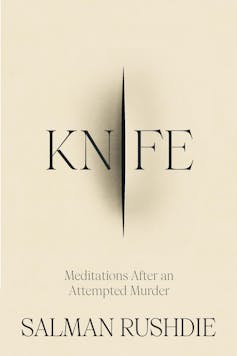In Knife, his memoir of surviving attack, Salman Rushdie confronts a world where liberal principles like free speech are old-fashioned
- Written by Paul Giles, Professor of English, Institute for Humanities and Social Sciences, ACU, Australian Catholic University

Knife[1] is Salman Rushdie’s account of how he narrowly survived an attempt on his life[2] in August 2022, in which he lost his right eye and partial use of his left hand. The attack ironically came when Rushdie was delivering a lecture on “the creation in America of safe spaces for writers from elsewhere”, at Chautauqua, in upstate New York.
A man named Hadi Matar has been charged with second-degree attempted murder[3]. He is an American-born resident of New Jersey in his early twenties, whose parents emigrated from Lebanon. Prosecutors allege the assault was a belated response to the fatwa, a legal ruling under Sharia law, issued in 1989 by Ayatollah Ruhollah Khomeini.
The Iranian leader called for Rushdie’s assassination after the publication of the author’s novel The Satanic Verses[4], which allegedly contained a blasphemous representation of the prophet Muhammad. Matar has pleaded not guilty to the charge, and his trial is still pending.
Review: Knife: Meditations After an Attempted Murder – Salman Rushdie (Jonathan Cape)
Knife is very good at recalling Rushdie’s grim memories of the attack. (His assailant appears in this book merely under the sobriquet of “the A”.) It also articulates with typically dry, self-deprecating humour the dismal prognoses of his various doctors. These are balanced against his own incorrigible sense of “optimism” and ardent will to live, along with the staunch love and support of his new wife, the writer and artist Rachel Eliza Griffiths.
















